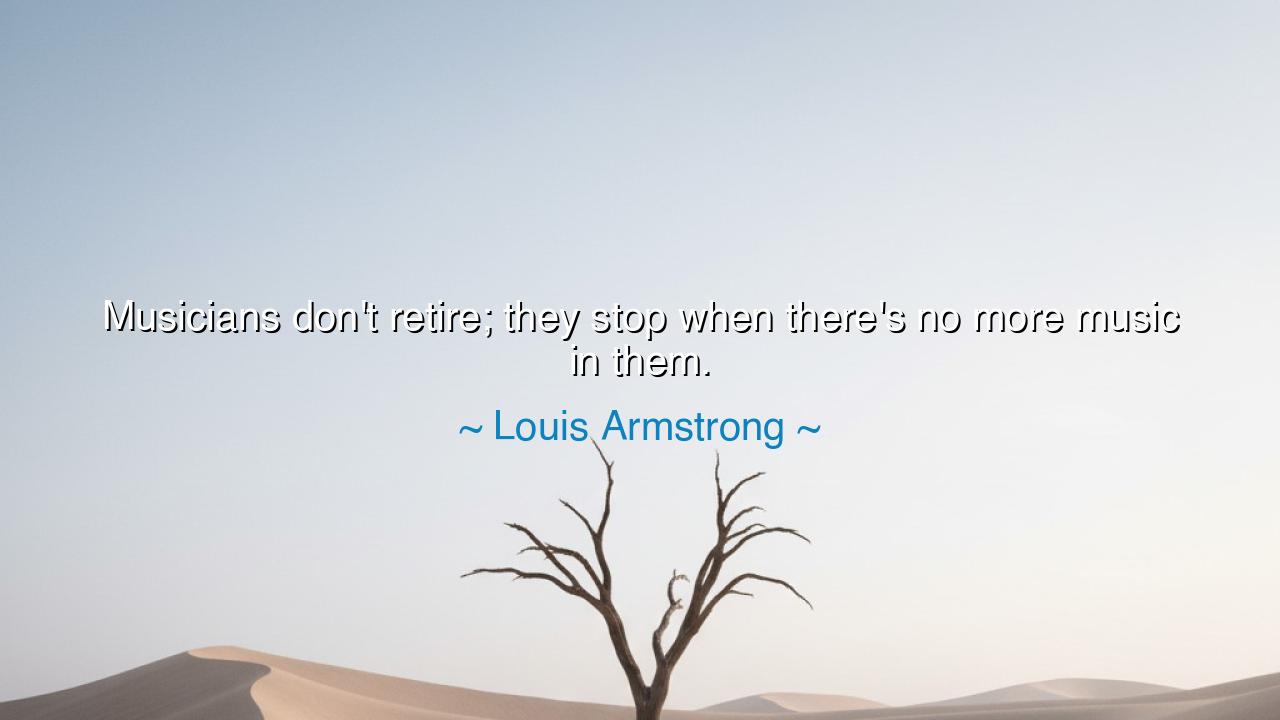
Musicians don't retire; they stop when there's no more music in






Hear now the immortal words of Louis Armstrong, trumpet in hand, voice like gravel and gold, who declared: “Musicians don’t retire; they stop when there’s no more music in them.” This is not merely a statement about the artist’s life, but a revelation of the human spirit. For music, in Armstrong’s vision, is not simply sound played upon an instrument—it is the lifeblood, the essence, the inner fire that sustains creation. To retire from such a calling is not to step away by choice, but only when the well within runs dry, when the spirit itself has given all it has to give.
The first truth here is that music is not a profession but a vocation. A job may be set aside, traded, or concluded at will. But a calling burns until the soul itself is spent. A musician does not labor only for wage or applause, but because the music inside them demands release. The trumpet must sound, the voice must sing, the hands must move across the keys, because silence would be death of the spirit. Armstrong knew this, for he himself played and sang through hardship, illness, and age—never retiring, only ceasing when breath and strength left him.
Consider the deeper meaning of “they stop when there’s no more music in them.” It is not age that halts the artist, nor the judgment of critics, nor even the fading of worldly fame. The true end comes only when the inner flame is exhausted. Until then, the artist continues, for to silence the music while it yet burns within is to deny one’s own soul. This is why many artists, even in frailty, continue their craft: for it is as necessary to them as air or water.
History bears witness to this truth. Think of Johann Sebastian Bach, who wrote music until his final days, his hands nearly blind upon the page. Or Beethoven, deaf and broken in body, yet pouring forth symphonies that shook the heavens. They did not retire—they only ceased when life itself ceased to pour music through them. Their greatness was not measured by how long they lived, but by how faithfully they released the endless stream of sound that dwelled within their hearts.
So too with Armstrong himself. From the streets of New Orleans to the stages of the world, his horn spoke of joy and sorrow, of laughter and struggle. Even when illness weakened him, he played, for his soul overflowed with music. To him, to stop playing while music remained within would have been betrayal. His life was proof that the artist’s true work ends only when the inner spring has run dry.
The lesson is clear: live by the fire that burns within you. Whatever your calling—whether art, teaching, healing, or building—do not measure it as a mere job to end with age or weariness. Continue so long as the passion is alive, so long as the inner voice commands you. Retire not by date nor decree, but only when your soul has spoken its last note. In this, you will live fully, with nothing left unsaid, nothing left uncreated.
Practical wisdom follows: ask yourself daily, What is the music within me? For some, it may be literal song; for others, it is the dream, the craft, the vision of what they were born to give. Cherish it. Feed it. Express it. Do not silence it for fear or for doubt. And when one day it leaves you, let it be said that you poured out every note, every word, every act of creation that your spirit contained.
Thus, remember always Armstrong’s words: “Musicians don’t retire; they stop when there’s no more music in them.” Take them as a charge for your own life. Live so fully in your calling that the world hears your song until the last note is gone. And when silence finally comes, it will not be the silence of regret, but the silence of a spirit that has given all it was meant to give.






AAdministratorAdministrator
Welcome, honored guests. Please leave a comment, we will respond soon